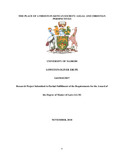| dc.description.abstract | This project examines the place of Atheists in the Kenyan legal system. It uses the example of the process of registration, suspension and deregistration of AIK in order to critically interrogate how the Kenyan legal system accommodate religious diversity and religious pluralism. Although the Constitution of Kenya 2010 contains an elaborate Bill of Rights framework, the place of Atheists in the Kenyan legal system continues to be in question. Despite the fact that the Constitution of Kenya 2010 contains elaborate human rights provisions geared towards the protection and respect for all Kenyans, the place of Atheists continues to be in question. This is because of the following reasons: firstly, the Constitution of Kenya 2010 does not explicitly recognize Atheists as a group. Secondly, the Constitution embodies an enduring tension between the desire to respect religious freedom on the one hand and to avoid institutionalization of any particular state religion. Thirdly, the constitution seeks to accommodate religious diversity and pluralism by adopting a critical liberal constitutional approach; this maintains the status of dominant groups in society, by legitimizing and perpetrating conservative hegemony. Fourthly, in practice the desire to protect the dominant system of social and power relations triumph over the need to protect the right of minority groups such as AIK. Fifthly, the political suppression of certain groups such as the AIK is disguised in the cloak of false constitutional and statutory validity. Lastly, contrary to the dictates of positivism; Church and State in Kenya are inseparable and legal questions need to be understood against the backdrop of such socio-economic and political contexts. This study relies on two theories; the human rights theory and the critical liberal constitutional theory. This study as well adopts a mixed research approach; doctrinal, case study and empirical research methodologies. The study was carried out among selected Christians, Muslims, Atheists and government officials. | en_US |



